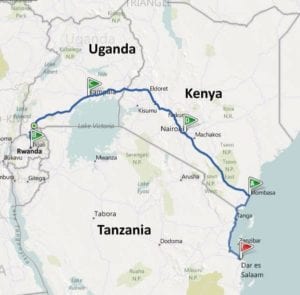It is estimated that Uganda loses approximately Shs900 billion ($360 million) annually on road due to limited railway functionality, a National Planning Authority official has said.
While presenting a revised draft of the National Vision 2040, Dr Patrick Birungi, Head of Strategic Planning, NPA told a government agencies’ meeting that Uganda’s over-reliance on roads as the main means to import and export goods is costing the economy money that would have been invested in other developmental areas.
“Using railway transport has a multiplier effect. There are many benefits on the reduced capital, operation and maintenance costs on roads,” Dr Birungi said in Kampala last week.
The Mombasa-Kampala route, also known as the Northern Corridor route, accounts for three-quarters of Uganda’s imports and exports.
According to the National Vision 2040 draft, Uganda has a railway line functionality deficit of about 2,400km of standard gauge with good rolling stock (Vision 2040) when compared to the existing 250km by 2011.
Despite road transport being Uganda’s major transportation means, the country is not doing any better in developing road infrastructure.
According to the National Vision 2040 draft, Uganda has a railway line functionality deficit of about 2,400km of standard gauge with good rolling stock (Vision 2040) when compared to the existing 250km by 2011.
Despite road transport being Uganda’s major transportation means, the country is not doing any better in developing road infrastructure.
Paved roads
According to the transport sector review, Uganda had only 3,300km of paved roads as of 2011, constituting a road density of 1.4km per 100 square kilo metres. When compared to the National Vision 2040 target of 62,000km of paved roads, constituting a 26.3km per 100 square kilometres leaves a gap of 58,700km of paved roads constituting 24.8km per 100 square kilometres to be bridged.
According to the transport sector review, Uganda had only 3,300km of paved roads as of 2011, constituting a road density of 1.4km per 100 square kilo metres. When compared to the National Vision 2040 target of 62,000km of paved roads, constituting a 26.3km per 100 square kilometres leaves a gap of 58,700km of paved roads constituting 24.8km per 100 square kilometres to be bridged.
Poor infrastructure, according to Mr Gideon Badagawa, executive director, Private Sector Foundation Uganda, is still the biggest obstacle to a successful private sector in Uganda.
Statistics from Trade Mark East Africa indicate that cargo traffic is expected to reach 24 million tonnes by 2015 and 117 million tonnes by 2030, increasing pressure on the existing infrastructure such as roads and rail and congestion at ports if capacity in the East African region is not boosted.
Statistics from Trade Mark East Africa indicate that cargo traffic is expected to reach 24 million tonnes by 2015 and 117 million tonnes by 2030, increasing pressure on the existing infrastructure such as roads and rail and congestion at ports if capacity in the East African region is not boosted.
Impact on economy
According the World Bank, poor infrastructure impedes the nation’s economic development and international competitiveness and yet in order to stimulate growth and reduce poverty, it is essential to improve the supply, quality and affordability of infrastructure services.
According the World Bank, poor infrastructure impedes the nation’s economic development and international competitiveness and yet in order to stimulate growth and reduce poverty, it is essential to improve the supply, quality and affordability of infrastructure services.
Dr Birungi, however, said although the National Development Plan identifies a number of infrastructure projects to be implemented by 2015, the projects are unlikely to be implemented due to inadequate funding.
While the projects to be implemented require about $19 billion, he said, government’s contribution over the last five years was estimated at about $5 billion, leaving a funding gap of approximately $14 billion. Source: http://www.monitor.co.ug
While the projects to be implemented require about $19 billion, he said, government’s contribution over the last five years was estimated at about $5 billion, leaving a funding gap of approximately $14 billion. Source: http://www.monitor.co.ug







